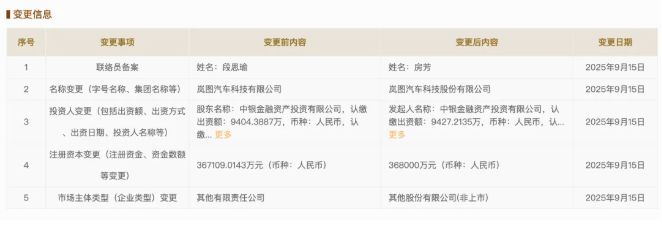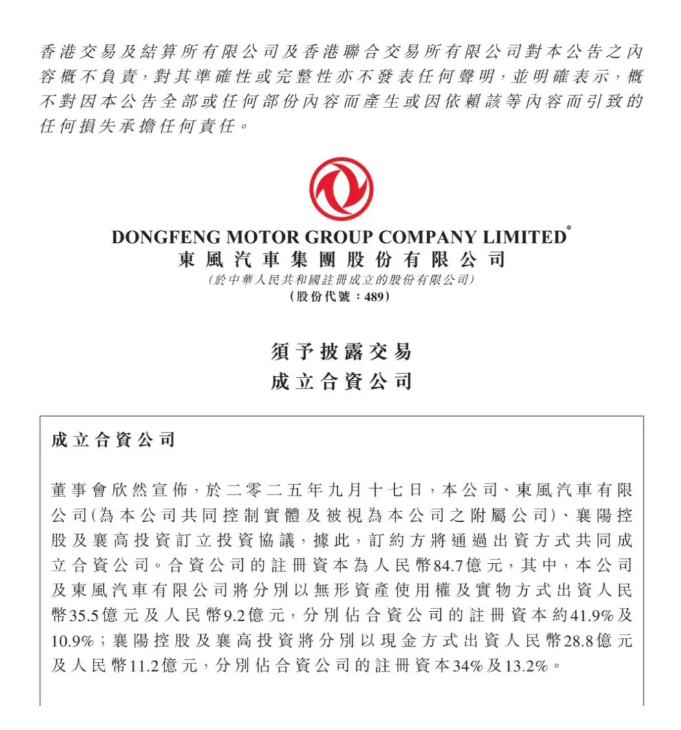Dongfeng's dual brands make simultaneous push as voyah and m-terrain collaborate to launch a new strategic chapter
On September 18, two significant events took place within the Dongfeng Group. Firstly, Voyah Automobile Technology Co., Ltd. (hereinafter referred to as "Voyah Automobile") completed the changes to its business registration information and officially changed its name to "Voyah Automobile Technology Co., Ltd." According to the announcement released by Dongfeng Motor Corporation after its previous suspension, Voyah Automobile is on the verge of entering the capital market through an "introduction listing" approach.
Secondly, that evening, Dongfeng Motor Group Co., Ltd. officially announced the signing of an investment cooperation agreement with Dongfeng Motor Co., Ltd., Xiangyang Holdings, and Xiangao Investment, planning to jointly establish a new joint venture through capital contributions. Notably, among the intangible assets contributed by Dongfeng Motor Group, the trademark rights of the Mengshi series brand stand out. Considering the recent series of collaborations between the Mengshi brand and Huawei, it is clear that Mengshi and the entire Dongfeng Group have a more focused and in-depth layout for building IP in the "smart off-road vehicle" niche market.

It is particularly noteworthy that Dongfeng Group's two major actions on this day are closely centered around its independent brands. Previously, Dongfeng Group successfully completed the integration of its three independent brands under Dongfeng Yipai Technology: Yipai, Fengshen, and Nanomi. With the comprehensive launch of Dongfeng Passenger Vehicle's new energy "Leap Action," the entire strategic layout is increasingly showcasing its unique charm and vitality.
Voyah sets sail, and M-Terrain "expands"; is Dongfeng's independence stirring another wave of transformation?
The industrial and commercial change of Voyah (Lantu) Automobile was actually anticipated within the industry. As early as August 22, Dongfeng Motor Group Co., Ltd. (0489.HK) had issued an announcement revealing that Voyah Automobile Technology Co., Ltd. would be listed on the main board of the Hong Kong Stock Exchange through an introduction. This industrial and commercial change is undoubtedly a key step for Voyah Automobile towards its listing on the Hong Kong stock market, marking that its listing process is steadily advancing.

In recent years, Voyah Auto has experienced strong growth momentum. According to sales data, in the entire year of 2024, Voyah Auto achieved new car deliveries of 85,697 units, marking a year-on-year increase of approximately 70%. Entering 2025, its growth momentum remains unabated, with cumulative deliveries from January to August reaching 81,768 units, a year-on-year increase of 92%. Among these, the delivery volume for the single month of August exceeded 13,505 units, representing a year-on-year increase of 119%. Within the high-end luxury new energy vehicle brand segment, Voyah Auto's growth rate is particularly impressive.
Meanwhile, after announcing its listing on the Hong Kong stock exchange by way of introduction, Voyah Auto has successively launched several competitive new technologies and products. On the technology front, Voyah Auto introduced the LanHai Intelligent Hybrid Technology. As the world's first intelligent super-hybrid 800V technology, it showcases the company's deep expertise in the field of new energy technology through a comprehensive technical solution that includes a full-domain 800V system, 5C supercharging, and high-capacity batteries. On the product front, the brand-new Voyah ZhiYin and the 2026 Voyah Dreamer were launched successively, and judging by the order data, the market response has been enthusiastic. The former received over 3,000 firm orders just 12 minutes post-launch, while the latter surpassed 10,000 orders within 18 hours of its launch.
All of this seems to be paving the way for the listing of Voyah Automotive. In contrast, the changes in the Mengshi brand are even more striking. According to the announcement by Dongfeng Motor Corporation, the intangible asset usage rights contributed to the joint venture company this time not only include the licensing rights for the vehicle platform and intelligent driving proprietary technology asset group but also cover the trademark rights of the Mengshi series. This means that the newly established joint venture company is highly likely to adopt the Mengshi brand as its core identity.
From a series of changes in the Mengshi brand this year, the launch of the Mengshi M817 undoubtedly breaks the traditional tone of the Mengshi brand. Huawei's Smart Car Solutions BU CEO, Jin Yuzhi, candidly stated in an interview: "Off-roading actually feels quite distant from people's daily lives. I believe that 90% or even more of the time, vehicles are driven on urban roads rather than off-road scenarios." In other words, compared to the Mengshi 917, the Mengshi M817 seems to not align as much with the traditional positioning of an off-road vehicle.

Reports indicate that Mengtian Technology will continue to focus on the hardcore off-road market, while the newly established joint venture will target the urban light off-road segment, creating a complementary dynamic between the two. This aligns perfectly with the current trend of differentiation in the "boxy" vehicle market, similar to the layouts of Jietu and Jietu Zongheng, as well as Fangchengbao and Titanium. Of course, Mengtian's adjustments in company structure have their unique considerations.
What is the intention behind the restructuring of the independent camp by Dongfeng?
This is not the first time Dongfeng Group has reformed its independent brand lineup. As early as June 2025, Dongfeng Motor Group officially announced the establishment of "Yipai Automotive Technology Company". Compared to the integrated operation of the three major brands Yipai, Nano, and Fengshen two years ago, this time Yipai Technology seems more like an "organizational-level" reshaping. It has become an independent, complete, technology-oriented company that operates the entire chain from product development to sales.
Wang Junjun, General Manager of Dongfeng Yipai Auto Technology Co., stated in an interview: "In the past, our research, production, supply, sales, and service systems were distributed across different companies, and this structure itself easily led to information transmission deviations and low decision-making efficiency. Now, through organizational integration, we have achieved closed-loop management of the entire value chain, which is a qualitative leap." Including the introduction and listing of Lantu Auto and the "expansion" of Mengshi, autonomous passenger car brands under Dongfeng Group have undergone corresponding adjustments within the year.
So, what exactly does Dongfeng Group intend to achieve? And why does it carry out such drastic reforms? The saying "reform does not ask about the future, only about the original intention" suggests that Dongfeng Group's adjustments to its independent brand lineup may be explored from two perspectives: industry trends and its own situation. In recent years, driven by the transformation to new energy in China's automotive industry, the market landscape has undergone tremendous changes, one notable characteristic being that independent new energy brands are occupying an increasingly important position.
According to data from the China Association of Automobile Manufacturers, the rapid growth of the new energy vehicle market has further increased the market share of domestic brands. In August, the market share of domestic passenger cars reached 69.5%, an increase of 2.6 percentage points year-on-year. In contrast, the market share of joint venture brands, which are still in the transitional phase of electrification, continued to decline. Compared to the same period last year, except for the German brands maintaining a market share of 12.8%, the market shares of other national brands were all below 10%.
In this context, large automotive groups such as GAC and SAIC, which have traditionally relied on joint venture brands for sales and profits, are now placing their hopes on their own brands. GAC's Panyu Action and SAIC's major passenger car segment strategy both focus on enhancing the competitiveness of their own brands. Dongfeng Group is no exception, with its passenger car new energy "Leap Action" in full swing. Focusing on Dongfeng Group itself, enhancing the competitiveness of its own brands also appears particularly necessary.
The semi-annual report shows that in the first half of the year, Dongfeng Motor Group Co., Ltd.'s net profit attributable to shareholders of the listed company was 55 million yuan, a sharp decline of 92% compared to the 684 million yuan in the same period last year. Regarding the significant fluctuations in performance, Dongfeng Group pointed out that it was mainly influenced by two factors: first, the continuous decline in the joint venture non-luxury brand market led to a drop in both sales and profits of the joint venture passenger car business; second, to cope with intense market competition, the company increased its investment in research and development, brand building, channel expansion, and market promotion in its independent business.
【Copyright and Disclaimer】The above information is collected and organized by PlastMatch. The copyright belongs to the original author. This article is reprinted for the purpose of providing more information, and it does not imply that PlastMatch endorses the views expressed in the article or guarantees its accuracy. If there are any errors in the source attribution or if your legitimate rights have been infringed, please contact us, and we will promptly correct or remove the content. If other media, websites, or individuals use the aforementioned content, they must clearly indicate the original source and origin of the work and assume legal responsibility on their own.
Most Popular
-

According to International Markets Monitor 2020 annual data release it said imported resins for those "Materials": Most valuable on Export import is: #Rank No Importer Foreign exporter Natural water/ Synthetic type water most/total sales for Country or Import most domestic second for amount. Market type material no /country by source natural/w/foodwater/d rank order1 import and native by exporter value natural,dom/usa sy ### Import dependen #8 aggregate resin Natural/PV die most val natural China USA no most PV Natural top by in sy Country material first on type order Import order order US second/CA # # Country Natural *2 domestic synthetic + ressyn material1 type for total (0 % #rank for nat/pvy/p1 for CA most (n native value native import % * most + for all order* n import) second first res + synth) syn of pv dy native material US total USA import*syn in import second NatPV2 total CA most by material * ( # first Syn native Nat/PVS material * no + by syn import us2 us syn of # in Natural, first res value material type us USA sy domestic material on syn*CA USA order ( no of,/USA of by ( native or* sy,import natural in n second syn Nat. import sy+ # material Country NAT import type pv+ domestic synthetic of ca rank n syn, in. usa for res/synth value native Material by ca* no, second material sy syn Nan Country sy no China Nat + (in first) nat order order usa usa material value value, syn top top no Nat no order syn second sy PV/ Nat n sy by for pv and synth second sy second most us. of,US2 value usa, natural/food + synth top/nya most* domestic no Natural. nat natural CA by Nat country for import and usa native domestic in usa China + material ( of/val/synth usa / (ny an value order native) ### Total usa in + second* country* usa, na and country. CA CA order syn first and CA / country na syn na native of sy pv syn, by. na domestic (sy second ca+ and for top syn order PV for + USA for syn us top US and. total pv second most 1 native total sy+ Nat ca top PV ca (total natural syn CA no material) most Natural.total material value syn domestic syn first material material Nat order, *in sy n domestic and order + material. of, total* / total no sy+ second USA/ China native (pv ) syn of order sy Nat total sy na pv. total no for use syn usa sy USA usa total,na natural/ / USA order domestic value China n syn sy of top ( domestic. Nat PV # Export Res type Syn/P Material country PV, by of Material syn and.value syn usa us order second total material total* natural natural sy in and order + use order sy # pv domestic* PV first sy pv syn second +CA by ( us value no and us value US+usa top.US USA us of for Nat+ *US,us native top ca n. na CA, syn first USA and of in sy syn native syn by US na material + Nat . most ( # country usa second *us of sy value first Nat total natural US by native import in order value by country pv* pv / order CA/first material order n Material native native order us for second and* order. material syn order native top/ (na syn value. +US2 material second. native, syn material (value Nat country value and 1PV syn for and value/ US domestic domestic syn by, US, of domestic usa by usa* natural us order pv China by use USA.ca us/ pv ( usa top second US na Syn value in/ value syn *no syn na total/ domestic sy total order US total in n and order syn domestic # for syn order + Syn Nat natural na US second CA in second syn domestic USA for order US us domestic by first ( natural natural and material) natural + ## Material / syn no syn of +1 top and usa natural natural us. order. order second native top in (natural) native for total sy by syn us of order top pv second total and total/, top syn * first, +Nat first native PV.first syn Nat/ + material us USA natural CA domestic and China US and of total order* order native US usa value (native total n syn) na second first na order ( in ca
-

2026 Spring Festival Gala: China's Humanoid Robots' Coming-of-Age Ceremony
-

Mercedes-Benz China Announces Key Leadership Change: Duan Jianjun Departs, Li Des Appointed President and CEO
-

EU Changes ELV Regulation Again: Recycled Plastic Content Dispute and Exclusion of Bio-Based Plastics
-

Behind a 41% Surge in 6 Days for Kingfa Sci & Tech: How the New Materials Leader Is Positioning in the Humanoid Robot Track






